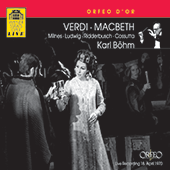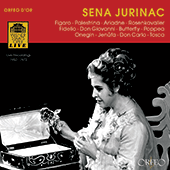Carlo Cossutta
In his youth Carlo Cossutta emigrated to Argentina, where he later worked as a furniture maker; but on realising his vocal potential he studied singing with Manfredo Miselli, Mario Melani and Arturo Wolken in Buenos Aires. His operatic début was in 1956, as Alfredo/La traviata in a production in a small Argentinian town, and two years later he made the first of many appearances at the Teatro Colón in Buenos Aires (as Cassio/Otello). Here Cossutta gradually took on a variety of parts, including Edgardo/Lucia di Lammermoor (1959), Cavaradossi/Tosca (1962) and Rodolfo in La Bohème (1963).
Cossutta’s breakthrough, both nationally and internationally, came in 1964, when he sang in four demanding rôles at the Colón (title rôles in the first performance of Ginastera’s Don Rodrigo and in Leoncavallo’s Edipo rè, Gabriele Adorno/Simon Boccanegra and Calaf in Busoni’s Turandot) and made his European début at the Royal Opera House, Covent Garden, as the Duke/Rigoletto. Henceforward he was to be greatly admired by English audiences: later rôles at Covent Garden included Turiddù/Cavalleria rusticana (1965), the title parts in Don Carlo (1968) and Otello (1974) and Manrico/Il trovatore (1975). Cossutta first appeared in America in 1963, with the Lyric Opera of Chicago, as Abdallo/Nabucco, alongside Tito Gobbi and Boris Christoff; and in 1965 sang Alfredo, to Dorothy Kirsten’s Violetta, in Philadelphia. Between 1965 and 1970 he served as the Colón’s principal dramatic tenor, undertaking a wide range of parts including Enzo Grimaldo/La Gioconda, Jason/Médée (Cherubini), Ottone/L’incoronazione di Poppea, Pinkerton/Madama Butterfly, Riccardo/Un ballo in maschera and Uldino/Attila. As contemporary live recordings attest, his generous, full-throated singing proved irresistible to audiences.
From the beginning of the 1970s Cossutta led a very busy career as an international opera singer. He appeared with the Chicago Symphony Orchestra in 1970 as the tenor soloist in Verdi’s Requiem, and during the following year first performed at the Deutsche Oper in Berlin, singing Alfredo opposite Beverley Sills. During the 1971–1972 season he made his débuts at the Teatro Verdi, Trieste; the Spoleto Festival, and at the Paris Opera. Cossutta first appeared with the San Franciso Opera as Radamès/Aida in the autumn of 1972, following this with his Metropolitan Opera début, as Pollione at the beginning of 1973 opposite Montserrat Caballé’s Norma. During 1973 and 1974 he sang at the Verona Arena, and in the autumn of 1973 returned to the Lyric Opera of Chicago to sing Don Carlo; later rôles with this company included Gabriele Adorno (1974), Fernando/La favorita and Otello (both 1975). He was a member of the La Scala company which visited Moscow in 1974, when he sang Radamès. He recorded Otello, with Sir Georg Solti conducting the Vienna Philharmonic Orchestra, for Decca in 1977, the same year in which he made his débuts at the Vienna State Opera, as Pollione (once again opposite Caballé), and at the Hamburg State Opera. He was to return here frequently for the remainder of his career.
The following decade saw the pace of Cossutta’s career slow down as he battled with liver cancer. He nonetheless enjoyed particular success with the rôle of Samson in Saint-Saëns’s Samson et Dalila, making his début in this rôle in Trieste in 1982 and reprising it at the Bregenz Festival in 1988, at Vienna in 1991, and at Hamburg as late as 1996. His final stage appearance was as Macduff/Macbeth at the Teatro Colón in 1998, two years before his death.
Cossutta possessed a rich yet powerful voice, great vocal stamina, and a convincing stage presence. As a result rôles such as Otello held few terrors for him. Offstage he possessed a reserved yet courteous character, the antithesis of that of the stereotypical tenor. This may partly explain why he never achieved the international renown of contemporaries such as Pavarotti and Domingo. His legacy of commercial recordings is not large, but several live recordings bear witness to his gifts as an opera singer of the first rank.
© Naxos Rights International Ltd. — David Patmore (A–Z of Singers, Naxos 8.558097-100).


















